A new county law went into effect yesterday on Maui. It’s something visitors should take note of since there is a fine of up to $1,000 possible for violating the new ruling.
The bottom line is this. Don’t use any chemical sunscreen on Maui. Otherwise, you might get a warning or a fine of up to $1,000. The only exception is for persons who have a prescription.
Maui County Council felt that the state ban that went into effect last year was inadequate in addressing the multiple chemicals in sunscreens damaging the island’s fragile ecosystems. The issue is that the banned chemicals can have slightly different versions, making them not technically prohibited according to state law.
Effective October 1, 2022, no chemical-based sunscreens can be used, sold, or distributed on Maui. That means you can’t bring a banned sunscreen and use it on Maui. This goes further than most other bans and provides warnings and substantial fines for using illegal sunscreens rather than just prohibiting their sale and distribution. We wonder how well visitors will be informed about the new law. If you live here, of course, you probably know about it.
Fines up to $1,000 are possible. But how likely is that?
The ordinance provides for fines up to $1,000. For now, warnings are more likely, although we’ve heard nothing about enforcement. You can read the new law below. Enforcement is said to be based on complaints received. Does that mean someone may call the police if they see you spraying a chemical sunscreen instead of applying a non-chemical white cream? We were told that a second warning is when fines may start to be in effect.
Similar Big Island law goes into effect on December 1.
The law there also prohibits the sale and distribution of sunscreens that are chemical rather than physical in their makeup. Taking a more conservative approach than $30 beach parking wielding Maui, Hawaii county has its own law about to take effect. That county isn’t going to try to enforce what people use but only control the distribution and availability in stores.
The State of Hawaii remains ahead of many other places in banning sunscreens that are damaging to marine environments and coral reefs.
So far, the state has only a ban on two ingredients, oxybenzone and octinoxate. Those are perhaps the two most common chemicals found in thousands of sunscreens. That law went into effect on January 1, 2021.
The state is contemplating enacting a broader ban on chemical sunscreens, somewhat like what the Big Island will be doing.
“Our natural environment is fragile, and our own interaction with the earth can have lasting impacts…. This new law is just one step toward protecting the health and resiliency of Hawaii’s coral reefs.” — Governor David Ige.
Other beach destinations with sunscreen bans; more are coming.
US Virgin Islands. Effective 2021, chemical sunscreens and importation/sale of sunscreens with oxybenzone and octinoxate.
Bonaire. The island banned the sale of chemical sunscreens in 2021.
Key West, Florida. A subsequent statewide act struck down a law banning chemical sunscreens.
Palau. The first country to ban chemical sunscreens. That law went into effect in 2020.
Aruba. Sunscreens containing oxybenzone have been prohibited since 2020.
Vast quantities of sunscreen chemicals enter the water.
One issue is that a significant percentage of sunscreen that is applied makes its way into the water. Over time with Maui’s enormous number of visitors, huge amounts of sunscreen end up in Hawaii’s coral reefs. This is believed to cause coral damage, bleaching, DNA injury, starvation, and reproductive and development issues. Reefs are an integral part of our marine ecosystem and are essential to the environment. According to NOAA, “coral reefs buffer adjacent shorelines from wave action and prevent erosion, property damage and loss of life.”
JAMA study said chemical sunscreens are more dangerous than previously revealed.
Children are more at risk than adults. The study in the Journal of the American Medical Association found that “sunscreen products containing avobenzone, oxybenzone, Ecamsule, and octocrylene need far more research. One concern is that blood concentration of the chemicals can be found after just one day of sunscreen use. These rise with continued use and applications. JAMA questioned if these products can be considered “generally regarded as safe and effective.”
“Oxybenzone… has been found in human breast milk (and) in amniotic fluid, urine, and blood… Some studies…have raised questions about the potential for oxybenzone to affect endocrine activity.” — JAMA
What do you think of the new sunscreen ban on Maui?
Ord. 5306Get Breaking Hawaii Travel News
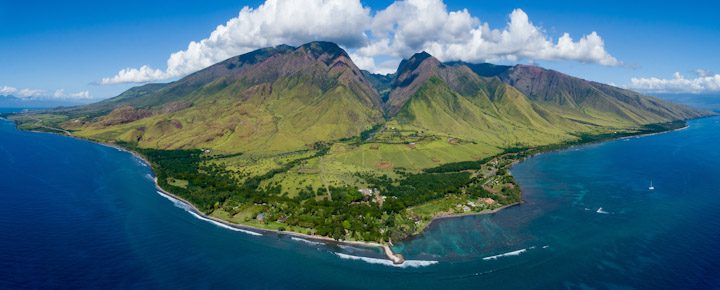
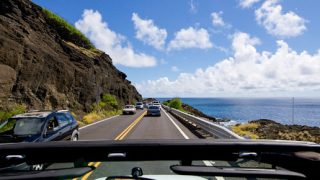
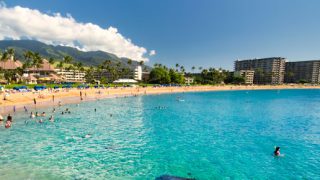
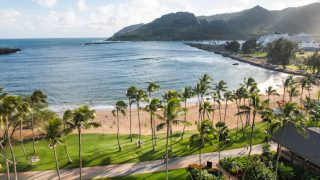

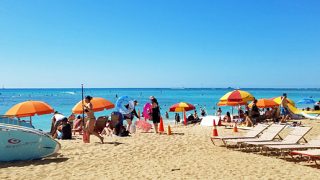
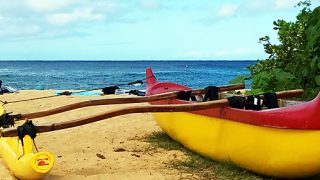
All for it. We have been using all natural sun screen products for years because of this issue and use sunscreen aqua wear as well. While the fine of $1,000 might seem severe, so is habitat loss so we are good with it. Arriving on Maui in November.
Aloha till then.
Mandatory announcement on every trans-Pacific flight arriving about reef safe sunscreen, perhaps also mentioning not to go near the honu. A $1,000 fine for what in many cases would be ignorance of state law and is legal in most other places is absurd.
This is nuts. There are no people more reef conscious than my family and friends, but this issue is about the Manufacturers, not the users. I think all visitors should be given a list of manufacturers that use prohibited items, possibly with cooperation of the airlines to view when arriving or possibly even ticketing passengers.
Fining people after the fact is the horse that already got out of the barn!
Never work. The government would rather fine people than corporations. People usually don’t fight back; corporations can afford to hire lawyers.
Of course, create a new law that punishes otherwise law abiding citizens! Typical Hawaii governance with a pound of prevention for every ounce of cure! In the meantime, sewage spills, water line breaks, and thousands of homeless defecating, shooting up, and littering our beaches! This kind of law makes the bureaucrats feel good about themselves and distracts them for bigger, more dangerous, and more difficult problems! Shame on the spineless political hacks that supposedly govern our beautiful state!
If I’m right the EPA is after the county of Maui fora $100,000 a day a fine for sewage dumping in the ocean. Clean up your act first!!
The fine of $1000 is a very small price to pay if we can save the reefs around Hawaii. I think that most people will comply with the law and very few will be fined $1000. However, for those who ignore the law, there has to be a consequence.
Whatever happened to making the punishment fit the “crime”?
How are they going to enforce this piece of stupidity? Is there going to be a “sunscreen checkpoint” for all flights arriving in Maui or the Big Island?
I lived on Maui for for years and loved it so much. I never have and never will wear sunscreen. Why on earth would I slather or spray chemicals on my largest organ. Most of my friends who used sunscreen eventually had skin cancer. I just never bask in the sun between 10 and 4. Simple. I’m 85 and have never had skin cancer, though spending my life in sun states – Texas, Arizona and Hawaii.
It is interesting that you link NOAA for the (obvious) statement that reefs are important, but switch to passive voice “this is believed to cause…” rather than cite any kind of research or scientist supporting the Maui ban. Actual conservation biologists and reef health experts know this drastic ban is useless, and point out that there’s zero evidence that titanium dioxide and other so called “reef safe” chemicals are actually helpful.
Completely absent from discussions in the legislature or the media is the fact that many residents who work/play daily far from the reefs depend on sunscreen to prevent skin cancer. Rather than support reef-saving measures that actually work politicians score cheap green-washing points with an easy ban.
Yes or something like it. $1000 seems way over the top to me but sunscreen pollution is an issue. It seems that the remediation and/or penalty should be standardized on all islands. By-the-way what does “chemical” even mean. State of Hawaii Act 104 disallows the use of sunscreens containing oxybenzone and octinoxate but there are hardly any products that contain those chemicals anymore. Even so-called “reef safe” mineral based sunscreens contain a boatload of chemicals. What is the definition of a true reef safe product?
Anecdote: At Poipu Beach the other day I was asking the lifeguard where the rip current was and he pointed out the stream of sunscreen washing out to sea. True but sad story.
No. No. and no, again!
All that will do is disenfranchise visitors to Maui, except for the Green Peace visitors, and create another level of the government to monitor, arrest and prosecute the “violators”.
How will the county monitor this? Use spies and snitches who roam the beaches looking for people who are putting on sunscreen?
I’m all for it. For myself, I wear a light airy rash guard and leggings. These work like SPF 50. In and out of the water. Problem solved.
Problem solved for you! But how about the other 99.9999999% of the population!?!?!?!
Good for you! But what about the other 99.9999999% of the population!
The best approach is to ban the use of products that contain threatening ingredients in areas where coral reefs are most susceptible to exposure. This type of regulatory policy has been in place for almost 15 years in Mexico’s Eco reserves, including Xcaret and Xel-Há.
Here is a good article from 2019 about the problem and why it should be nationwide not just in Hawaii. dailymail.co.uk/health/article-7025145/Why-sunscreen-better-Europe-EU-allows-27-UVA-blocking-ingredients.html
Is this for use only on the beach? Or pools also? Because if I bring something in and don’t use it on the beach, only when walking around? Looking for clarification on this
Correct – the issue is coral degradation.
The issue is coral degradation so you’re fine with what you described.
You should not use it at all, even if you don’t go into the ocean. When you shower the chemicals go down the drain and eventually find their way to the ocean.
Perhaps one of the state agencies could, with input of all airlines flying to Hawaii, produce a short video that would be played at the start of All Flights, just like the safety presentation. I have pitched this idea to HAL a time or two over the years.
All efforts to protect the reef I would support. As the Agricultural screen is done they should include sunscreens to be a part of the screening process. Airlines,hotels car rental should also alert the travelers of the new law at time of booking to educate all travelers to the islands.
Yes, they definitely should fine people. So sick of having the clueless and rude people of this world contaminate our water , land and air that we all have to share. All of our laws should be enforced. No smoking on the beaches as well!! Cigarette butts are e v e r y w h e r e! Disgusting habit. Smoking in public spread Covid repeatedly throughout the restaurants’ staffs across the islands (and on mainland) – but it is never outlawed in public and it’s not enforced on the beaches where it is illegal. Cigarette smoke, even in small quantities, exposes everybody who is downwind or nearby to carcinogens as does spraying these banned sunscreens. I’m literally physically sick and tired from exposure to these.
Ban sunscreen, but leave the dilapidated vehicles parked on the streets and the waterfront. what
are the tent cities, using a “facility”?
Hawaii should hold high environmental standards. Enough chemicals being dumped on our Earth
I understand banning sunscreen products, but to go so far as making it a fine was ridiculous in my book
Banning chemical sun screens is such a good decision. Thank you.
Sorry but you obviously don’t live in a an area where the only sunscreens that are effective are the chemical ones. We never use a chemical sunscreen when visiting Hawaii but at home, in the Skin Cancer Capital of the USA, we only use chemical sunscreens.
During our last trip to Maui I noticed that a lot of snorkelers were wearing sun protective shirts. I’ve read that a lot of these shirts are chemically treated with some dangerous ingredients. Could this be part of the problem as well?
Yes anything toxic to our food supply should always be a fine by companies trying to lie to consumers about safe for the environment BS.
Good for you.i lived in Hawaii
For around 20 years.it should have started back then.we don’t live in Hawaii anymore(sad for us)but we still have film their so go for it you have my vote.
I read this article yesterday and the thing that really stuck out was that there has been no education of visitors about these changes. I was in the Lahaina Safeway today and the man in front of me was complaining that he couldn’t buy sunscreen and if he got skin cancer it was on Hawaii. I let him know that he could not buy chemicals sunscreens but that mineral sunscreens containing zinc oxide are freely available. I then went next-door to Longs and saw a full display of mineral sunscreens and bought a bottle since I have visitors coming this week who may not be aware of these changes. I hope no one gets fined until there is much more education about I need to move away from chemical sunscreens. As always, thanks for this article!
Hi Kevin.
Thanks. Education is a big part and we didn’t see anything about that being mentioned thus far by the county.
Aloha.
Hi I was just curious do you have a list of the preferred sunscreens to use in the islands thank you
Hi Cheryl.
We’re mentioned this earlier. There are easily 100 brands of sunscreens. A good place to start might be here: https://www.ewg.org/sunscreen/.
Aloha.
Disappointed, EWG is a 501 (3) (C), non-profit, California and Minnesota based, who could be just another body of subjective guidelines predicated on mandated Diversity and Equity, that has no reality in the real world. Why does one have to go to the end to find out who this innocuous Brand is ‘Environmental Working Group’ is an activist group, pushing an agenda that has in it’s ranking #’s I.e. ‘5’ contradictory information the reader cannot deciminate (sharonmahan.com). Why no Reef Safe Category?
And guess what – you have to sign up for the website in order to see the list – or at least that was my experience just now. And “Reef Safe” apparently isn’t what it’s cracked up to be. We’re devoted to Blue Lizard after 3 dermatologists in 3 practices recommended it after I got a melanoma using Sun Bum (long story). Most Blue Lizard is labelled “Reef Safe” but only a few of their products have nothing more than Zinc Oxide and Titanium Dioxide (sorry, too lazy to look up the correct names). Those we use in Hawaii, the others we use at home.
Mahalo for your article.
Hawaii is not Disneyland.
Not an amusement park.
The fascination and love of natural beauty should be motivation enough to get educated and respect the aina.
Removing the products at the source is always the best way.
Education of the public will take a lot of effort on the part of the tourism industry, retail and DLNR.
Fines, yes when other efforts are exhausted.
Aloha
Yes.
We visited Kauai last July. Our first stop was Costco, and one of our first purchases was sunscreen. We had purposefully waited to buy in Hawaii to make sure we got reef safe sunscreen. To our surprise, they had only one reef safe brand and when we asked why, we were told Costco didn’t want to force us to buy a certain type against our wishes. We were shocked because we figured only reef safe would be sold in Hawaii! We bought the one reef safe brand. It should be all anyone in the state sells!
Mahalo for your coverage.
Amen, if Stores in the State are selling Brands that damage Coral Reefs, they are part of the problem, not the cure, and the Retailer knowingly profiting off the possibly unknowing Tourist is guilty. The State has a responsibility if they are going to create such Laws to Police them against any and all. Ignorance of the Law, may not be an excuse, however, it would certainly look more favorably on the Tourist who purchased locally, then the Merchant who both ignored the Law and profited knowing they were working against State Law!
Is there somewhere that I can find a list of acceptable sunscreens ? I will be visiting in February.
I don’t know if BofH will publish this but we’re devoted to Blue Lizard after 3 dermatologists in 3 practices recommended it after I got a melanoma using Sun Bum (long story). Most Blue Lizard is labelled “Reef Safe” but only a few of their products have nothing more than Zinc Oxide and Titanium Dioxide (sorry, too lazy to look up the correct names). Those we use in Hawaii, the others we use at home. You can get it on line (look for the sales) or at some Walmarts. A bit pricey (just like all the other “specialty sunscreens) but it goes a long way.
I’m all for it. The hard part is getting the word out and letting everyone know. Then who’s going to enforce this law and how?
I’ll come up with a small test strip you apply to the body, if it turns Red $$$$
Recently, this past spring, my husband and I visited Maui. I brought only reef safe sunscreen. The first day, after multiple applications and taking refuge under a tree for most of the day I became very sunburned. Much more sunscreen and as little suntime as possible for the next 9 days and I left the island red as a lobster. I found out, especially since I only had limited time in the water, I should use regular sunscreen when not in the water. I really need a good sunscreen. I’m willing to forgo the water in order to protect my skin!
I’ve mentioned a few times that we only use the (truly) chemical free sunscreens when in Hawaii. Otherwise, living in the “Skin Cancer Capital of the US”, we have to use chemical sunscreens.
First, let me say that I 1000% agree with protecting the reefs – Hawaiian or otherwise – from the chemicals in sunscreen. But I respectfully ask that those encouraging all chemical sunscreens to be eliminated from manufacture. Please understand that in certain circumstances (high altitude, dry climate), those chemicals help protect those of us who live in those circumstances better than pure “mineral” sunscreens. As I’ve said repeatedly in this thread – use what you need to survive in your home environment but just be careful what you use in Hawaii or other ocean-side situations. We use “mineral-based” at home and strictly “mineral” when in the islands. When just about everyone you know has had at least one melanoma, you need to be careful.
My husband and I love being able to visit Maui. We are very much in favor of the chemical based sunscreen ban. We believe we are stewards of our world and we should all do our part to keep our stewardship healthy and thriving. We appreciate being able to visit and experience the aloha and hope we are able to return the aloha.
Thanks for the updates on the islands that we love.
Thank you Nancy, I believe you get it. We are all in this together. Every last one of us. No one is excluded or exempt.
It’s to everyone’s better interest that we all work together to protect and cherish what remains of our beautiful gift. Not only Hawaii but our planet.
I’m very proud to live in Maui and support all meaningful efforts to protect the beauty and Aloha that is Hawaii.
This is so dumb. I mean… Who is going to enforce this? The Sunscreen Police? This would never hold up in court if challenged anyway. And who is to say for sure if these sunscreens actually have Any measurable effect on anything in Hawaii? Think about all of the Other pollutants that go into the waters around Hawaii Every day. There is no possible way to somehow isolate those pollutants from the miniscule amount of sunscreens of any kind that end up in Hawaiian waters. But it doesn’t surprise me. Of All the problems that Maui has–This is what they are focusing their collective energies on? What a joke.
Mahalo Beat of Hawaii for asking the questions we all want asked!
As a resident, I think $1000 is excessive, unless we’re actually trying to kill tourism.
Our reefs are being damaged by several things, especially uninformed divers and snorkeling. I’ve seen so many people, visitors and residents, standing on the reefs, breaking off coral and not being informed to stop.
All this is taking a toll on our ecosystem.
Those people should be fined that $1000 dollars!
I think all incoming visitors should watch a video or sign documents letting them know how to behave in our fragile environment, but somehow common sense can’t be common anymore.
Stay safe and blessed
Aloha always 🌺
Hi Pam.
Thanks for your input on this subject too. Best regards!
Aloha.
Thanks for the info. We go to Maui soon.
As a frequent visitor to the Big Island,I Love it! We tried so hard here on Key West. Our reef is so precious to us. We passed a ban only to have political powers in Tallahassee repeal it. They either don’t get it or they don’t care. So sad.
Good
I support all efforts to take care of Hawaii’s natural environment.
Here’s the link to the list again:
hawaii.com/travel-info/reef-safe-sunscreen/